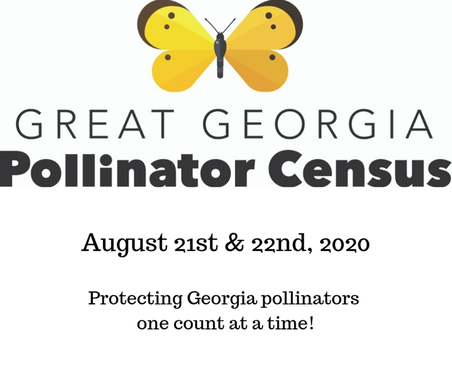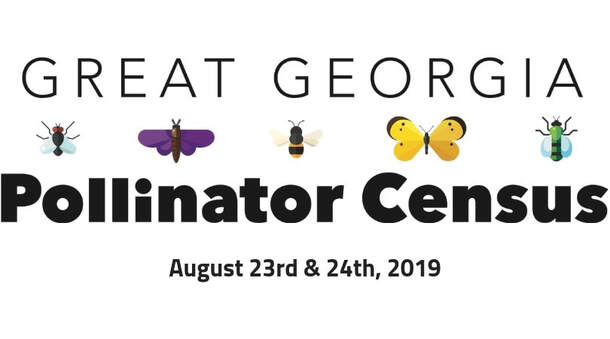
[email protected]
On August 23rd and 24th Georgians joined together to support insect conservation by counting insects in the Great Georgia Pollinator Census. Led by University of Georgia Extension, this community science initiative project resulted in over 4,600 counts submitted with over 133,000 insect visits tallied and reported. Eighty-five percent of Georgia’s 159 counties had participants submit results. As far as we know this is the only census of its kind in the country and so our tagline for the project was “Be Part of Georgia Pollinator History.”
Beginnings and Inspiration
Teachers leading school gardens and most community gardeners are not usually trained in entomology. Many Georgia gardeners do not know the difference between a beneficial insect and a pest; they struggle with insect identification. Often gardeners are unsure of how to make their garden friendly for beneficial insects like pollinators. The need for informed and educated gardeners is crucial to increase pollinator conservation, especially for teachers who are instructing students. This became increasingly evident as I traveled around the state assisting school and community gardeners with their garden issues.
Also, there has not been an overall pollinator inventory taken in Georgia. While providing current pollinator population data of interest, a census serves as a baseline for future research.
In 2017 we launched a pollinator census pilot project. Gardeners from fifty gardens agreed to participate. We used the results from the first pilot project and a follow-up project in 2018 to fine-tune our counting criteria. We wanted to ensure that the census was doable for our citizens while generating useful data. During late 2018 we finalized our process and announced the 2019 dates for the Great Georgia Pollinator Census.
Although the Great Georgia Pollinator Census was designed for any citizen to participate, we were especially interested in the participation of school groups, and especially those who have science, technology, engineering and math (STEM) programs and are perhaps working towards STEM certification. For Title 1 schools this was a science program at no cost.
1. Create sustainable pollinator habitat across Georgia.
2. Increase entomological literacy of Georgians so they will appreciate insect diversity in their gardens, learning that most insects are not pests.
3. Generate snapshot of Georgia’s pollinator populations.
A project website houses the project, including resources like lesson plans and class ideas for teachers.
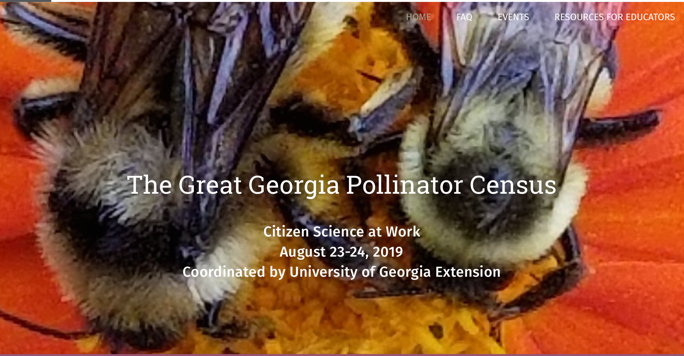
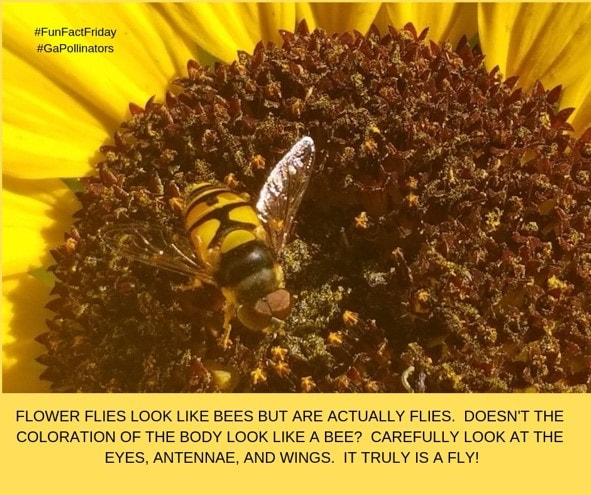
University of Georgia Extension agents and Master Gardener Extension Volunteers were educated in train-the-trainer sessions so that they could host events, teach insect identification, and instruct their clients on how to participate in the census. Supported by the website, over 115 Extension census-related events took place in 2019.
Other stakeholder organizations were recruited as partners in the project. Partners were asked to promote the project and host events around the census. Partners included Bee City USA, Georgia Tech, Callaway Gardens, Georgia Native Plant Society, University of North Georgia, Georgia Department of Natural Resources, The Garden Club of Georgia and others. This project could not have been successful without our partners!
The director of Georgia Tech’s Urban Bee Lab joined me in a promotional video This is just one example of multimedia tools used in the project. The local media, like the Farm Monitor, also promoted the project.
Insect Counting
Participants were asked to choose a favorite pollinator plant for counting, a plant showing insect activity. Each count took 15 minutes. During the census Georgians counted insects and put them in these categories:
- carpenter bees (For this study “carpenter bee” refers to the large Xylocopa genus of carpenter bee.)
- bumble bees
- honey bees
- small bees
- flies
- butterflies
- wasps
- other insects
Participants counted the number of times an insect landed on their plant so they were actually counting insect visits. Census locations were diverse! Insects were tallied at 4-H gardens, gardens from the Garden Clubs of America and Daughters of the American Revolution spaces. People participated at several Georgia State Parks. Businesses also participated with the Blue Ridge Humane Society hosting a count as well as Slow Pour Brewing Company. The golfers at Oaks Grove Golf Course and several Girl Scout Troops counted. The monks at Monastery of the Holy Spirit also participated. Individuals counted at home and with their families. We had a diverse group of counters!
 |
 |

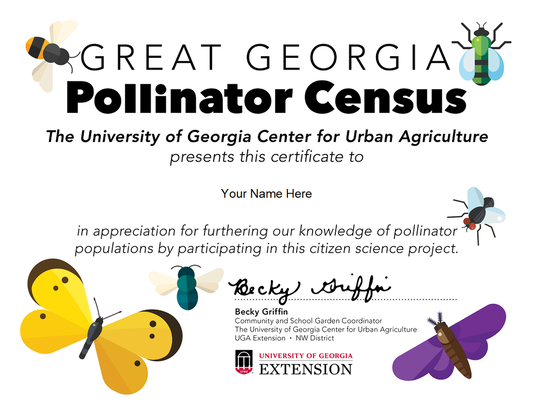
The most frequent comment we heard was how wonderful it was to sit still for the 15 minutes and just watch the insects. This has been the most rewarding part of the census for me.” Becky Griffin
With enthusiastic counters submitting more counts than expected, we were very pleased with participation. When a concerned older gentlemen was having trouble uploading his counts to the website, he phoned me to ensure his counts would be registered. I was happy to upload his counts for him. The most frequent comment we heard was how wonderful it was to sit still for the 15 minutes and just watch the insects. This has been the most rewarding part of the census for me.
Here are some comments from participants: “I actually learned, for the first time, how to distinguish between carpenter and bumble bees and honey and small bees!” and “The fear you feel about pollinators decreases as your knowledge increases.” A couple of comments from students: “Bugs love tomatoes.” and “I got to see some animals that I have never seen before and to me that was really cool.” And from an educator: “My fourth grade class was excited to see the number of pollinators. They oftentimes miss the smaller species, as they focus on the larger, more noticeable, ‘cuter’ animals. This experience helped them gain an appreciation and understanding of how connected all species are to the health of this planet. Happily, they found beauty in all too!”
We have started sifting through the data and hopefully will have several articles submitted for publication beginning in late 2019.
Georgians mark your calendars! We will be repeating the census on August 21st and 22nd, 2020.
